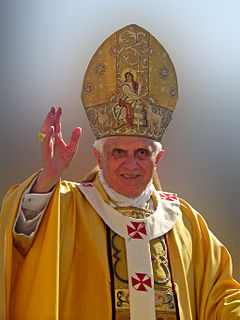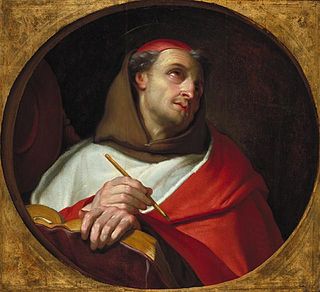 W
WAugustine of Hippo, also known as Saint Augustine, was a theologian and philosopher of Berber origin and the bishop of Hippo Regius in Numidia, Roman North Africa. His writings influenced the development of Western philosophy and Western Christianity, and he is viewed as one of the most important Church Fathers of the Latin Church in the Patristic Period. His many important works include The City of God, On Christian Doctrine, and Confessions.
 W
WPope Benedict XVI is a retired prelate of the Catholic Church who served as the head of the Church and the sovereign of the Vatican City State from 2005 until his resignation in 2013. Benedict's election as pope occurred in the 2005 papal conclave that followed the death of Pope John Paul II. Benedict chose to be known by the title "pope emeritus" upon his resignation.
 W
WAnicius Manlius Severinus Boethius, commonly called Boethius, was a Roman senator, consul, magister officiorum, and philosopher of the early 6th century. He was born about a year after Odoacer deposed the last Western Roman Emperor and declared himself King of Italy. Boethius entered public service under Ostrogothic King Theodoric the Great, who later imprisoned and executed him in 524 on charges of conspiracy to overthrow him.
 W
WBonaventure, born Giovanni di Fidanza, was an Italian medieval Franciscan, scholastic theologian and philosopher. The seventh Minister General of the Order of Friars Minor, he was also Cardinal Bishop of Albano. He was canonised on 14 April 1482 by Pope Sixtus IV and declared a Doctor of the Church in the year 1588 by Pope Sixtus V. He is known as the "Seraphic Doctor". His feast day is July 15. Many writings believed in the Middle Ages to be his are now collected under the name Pseudo-Bonaventure.
 W
WRené Descartes was a French philosopher, mathematician, and scientist who invented analytic geometry, linking the previously separate fields of geometry and algebra. He spent a large portion of his working life in the Dutch Republic, initially serving the Dutch States Army of Maurice of Nassau, Prince of Orange and the Stadtholder of the United Provinces. One of the most notable intellectual figures of the Dutch Golden Age, Descartes is also widely regarded as one of the founders of modern philosophy and algebraic geometry.
 W
WJohn Duns, commonly called Duns Scotus, was a Scottish Catholic priest and Franciscan friar, university professor, philosopher, and theologian. He is one of the four most important philosopher-theologians of Western Europe in the High Middle Ages, together with Thomas Aquinas, Bonaventure, and William of Ockham. Scotus has had considerable influence on both Catholic and secular thought. The doctrines for which he is best known are the "univocity of being", that existence is the most abstract concept we have, applicable to everything that exists; the formal distinction, a way of distinguishing between different aspects of the same thing; and the idea of haecceity, the property supposed to be in each individual thing that makes it an individual. Scotus also developed a complex argument for the existence of God, and argued for the Immaculate Conception of Mary.
 W
WGiles of Rome O.S.A., was a Medieval philosopher and Scholastic theologian and a friar of the Order of St Augustine, who was also appointed to the positions of Prior General of his Order and as Archbishop of Bourges. He is famed as being a logician, producing a commentary on the Organon by Aristotle, and for his authorship of two important works, De Ecclesiastica Potestate, a major text of early 14th century Papalism, and De Regimine Principum, a guide book for Christian temporal leadership. Giles was styled Doctor Fundatissimus by Pope Benedict XIV.
 W
WGregory of Rimini, also called Gregorius de Arimino or Ariminensis, was one of the great scholastic philosophers and theologians of the Middle Ages. He was the first scholastic writer to unite the Oxonian and Parisian traditions in 14th-century philosophy, and his work had a lasting influence in the Late Middle Ages and Reformation. His scholastic nicknames were Doctor acutus and Doctor authenticus.
 W
WIsidore of Seville was a Spanish scholar and cleric. For over three decades, he was Archbishop of Seville. He is widely regarded, in the words of 19th-century historian Montalembert, as "the last scholar of the ancient world".
 W
WNicolas Malebranche, was a French Oratorian priest and rationalist philosopher. In his works, he sought to synthesize the thought of St. Augustine and Descartes, in order to demonstrate the active role of God in every aspect of the world. Malebranche is best known for his doctrines of vision in God, occasionalism and ontologism.
 W
WJohn Henry Newman, C.O. was an English theologian, scholar and poet, first an Anglican priest and later a Catholic priest and cardinal, who was an important and controversial figure in the religious history of England in the 19th century. He was known nationally by the mid-1830s, and was canonised as a saint in the Catholic Church in 2019.